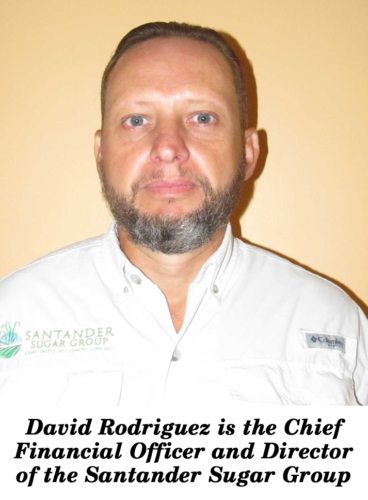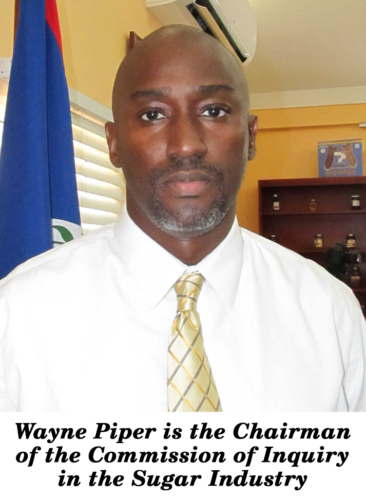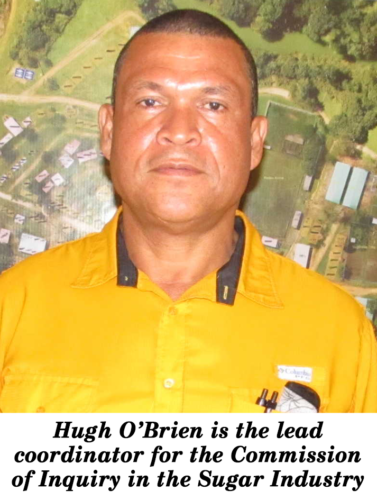Photo: (l-r) Commissioners Andrew Church (South Africa); Robert Marriet (Mauritius);Vinod Ramharai (Mauritius); Simon Gibbons (United Kingdom); Wayne Piper (Jamaica); Kritty Neermal; Jefferey Joseph (Belize)
by Orlando Pulido
BELMOPAN, Tues. Sept. 3, 2024
The fifth public hearing for the Commission of Inquiry (COI) into the Sugar Cane Industry was held on Monday, September 2, in the Ministry of Agriculture’s conference room in Belmopan. It was an opportunity for the COI to gather more information on the sugar industry in the western portion of the country (Cayo primarily).

David Rodriguez, Chief Financial Officer and Director of the Santander Sugar Group, which operates in the Cayo area, appeared before the Commission on Monday. Rodriguez informed the COI that thus far Santander has invested 500 million dollars in Belize.
The COI has had four sittings in the north of Belize since Tuesday of last week.
“What we have done, these are the formal hearings we are having. We [are] actually meeting with the stakeholders and collecting their evidence on the record in relation to how they operate within the sugar industry, what their efficiencies are, what their difficulties they [are] having,” said Wayne Piper, Chairman of the COI.

He went on to point out the significant impact that external forces have on the industry: “The biggest variable is cost and access to markets, so [we] immediately look at the cost of sugar on the world market. When cost [prices] are up, there is a big benefit to the local industry. When cost [prices] are down, it’s a little bit more difficult, and that is when you see a lot of more tension, especially in the north between the mill and the farmers themselves,” he said.
After this set of public hearings, which concludes on Thursday of this week, the commissioners will start working on their report and their recommendations, and they have to submit their final report to the Government of Belize by November 30, 2024. The COI started with foreign-based commissioners meeting virtually, before they made a trip to Belize earlier this year.
“All commissioners came down [in June of this year] and they visited with the farmers up north; they visited the production fields in the west; they visited the factory at [the Belize Sugar Industries] BSI, and they visited the factory at Santander; and they met with various stakeholders in session by having just discussions,” said Hugh O’Brien, the Government of Belize’s lead coordinator.

“We wanted to make sure that there is a legislation that is more modern and can facilitate the growth and expansion of a modern sugar cane industry in Belize that benefits all parties – the growers, the millers or the sugar cane processing plants, as well as the country and people of Belize,” he said.
AMANDALA asked O’Brien why there has been a periodic shortage of sugar in the local market. He stated, “One of the main reasons why there is a shortage of sugar on the local market is that … BSI produces enough sugar for the local market; in fact, they put more than what we consume in the local market. But here in Belize sugar retails officially [at] a controlled price [of] 75 cents a pound, while you can buy sugar right next door in Chetumal for $2.25 Belize a pound.”
Santander disclosed on Monday that they are studying the performance of various Brazilian sugar cane varieties that are more tolerant to drought and have high sugar content. A similar effort is being made in the north, with the Sugar Control Board and BSI working together to look for other sugar cane varieties that have a higher content of sugar and are more tolerant to climatic conditions in the north of Belize.
As the Commission of Inquiry does its work, it has been focused on how small sugar cane farmers can be protected, and on whether ecological and environmental sustainability practices within the sugar industry are being exercised. The COI will also be looking at the legislative mechanisms that are in place in the country and the current laws, and will make recommendations for modernization.

